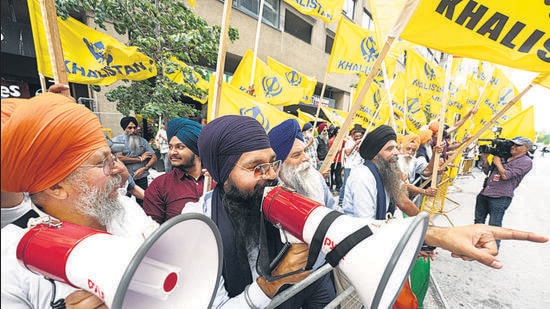
A group supporting Khalistan staged a protest outside the building that houses India’s consulate in Toronto, attracting roughly 250 supporters. The rally was sponsored by the Sikhs for Justice (SFJ), a secessionist group that had previously disseminated infamous “Kill India” posters online, aimed at India’s top diplomats in Canada.
The pro-Khalistan demonstration was met with a counter-rally from pro-India supporters on the opposite side of the street. In an attempt to keep the peace, Toronto Police intervened, creating a barrier between the two factions and blocking traffic on Bloor Street where the consulate building resides.
Tensions escalated when some pro-Khalistan protestors tried to break through the police barrier and assault the pro-India group, but police pushed them back. Two protestors were taken into custody; one for rushing the barricade and another for allegedly assaulting a police officer. After a three-hour standoff, the Toronto Police released the arrested protestors without charges.
The Khalistan supporters displayed posters of SFJ leader Hardeep Singh Nijjar, who was murdered by unidentified attackers in Surrey, British Columbia on June 18. The protestors accused the Indian government of being behind the murder. Other banners advocated for the forthcoming Punjab Referendum in the Greater Toronto Area, set for July 16. Some protestors sported jackets emblazoned with “Republic of Khalistan” and an image of an AK47.
Despite being outnumbered, the pro-India group remained resilient. After the rally was dispersed by the police in light rain, Arvind Mishra, one of the pro-India demonstrators, commented, “We successfully resisted the Khalistanis, who persistently infringe upon the boundaries of free speech.” Another supporter, Neel Sehgal, noted the Khalistanis’ violent tendencies and urged Canadian Prime Minister Justin Trudeau to ban violent demonstrations and referendums.
Khalistani supporters also organized smaller-scale protests in Ottawa and Vancouver. Around 30 people gathered peacefully near the Indian High Commission in Ottawa, while 50 participants attended the uneventful protest in Vancouver.
The Canadian authorities have heightened security in all three cities, leading an Indian official to note that they seem to be “responsive” to India’s concerns.
These actions come after a series of posters titled “Kill India”, targeting Indian diplomats in Canada, the US, UK, and Australia, were released. The SFJ has also threatened to “besiege” the Indian mission in Canada on August 15.
A poster named “War Zone” targeting Indian diplomats in Canada was found outside the Bharat Mata Mandir temple in Brampton but was later removed.
Canadian Foreign Affairs Minister Mélanie Joly declared the posters “unacceptable,” while National Defence Minister Anita Anand assured continued safety for foreign diplomats in Canada.
Earlier this month, India expressed dissatisfaction with Canada’s response to pro-Khalistan activities, summoning Canadian envoy Cameron Mackay to voice concerns about threats to Indian diplomats.
SFJ’s principal figure in the Metro Vancouver region, Nijjar, is considered by Indian law enforcement as the head of the Khalistan Tiger Force and faces several terror-related charges. The National Investigation Agency announced a ₹10 lakh reward for information leading to Nijjar’s arrest. These charges have not been tested in Canadian courts, and the SFJ maintains a non-violent stance.
Report a Khalistani below
Be the first to comment